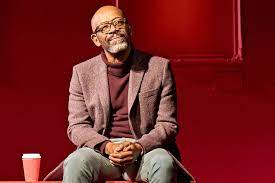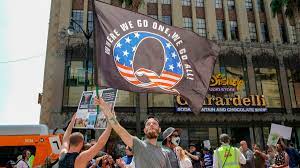"All my work is one thing, as it were, it may appear different but it is essentially the same" - Bridget Riley
On the 24th of April last year, Bridget Riley celebrated her ninetieth birthday. I'm not sure how she celebrated it but I know how the Lighgbox in Woking did and that's because on Saturday I met with my friend Darren and we went there to have a look at an exhibition, Bridget Riley:Pleasures of Sight, of her work.
It was a smallish collection but it managed to give a decent flavour of what Riley's all about. I've written far more extensively on Riley before (following a career spanning retrospective at the Hayward Gallery in London at the end of 2019) and I've even covered one of her smaller shows (at the David Zwirner, in 2018) so this, a show somewhere between the two - in the Goldilocks zone, will be a more casual approach.
Red Movement (2005)
A brief account, basically, of a nice (and surprisingly sunny February) day out with a good mate looking at some nice paintings, drinking coffee and ginger beer, and eating veggie burgers and fries in the Marciano Lounge (my halloumi burger was one of the nicest I've ever had).
Before you even get into the exhibition proper, but after you've climbed some pretty steep stairs, there's an early, undated, figurative work. Probably made in the fifties when she was studying at Goldsmiths College of Art and the Royal College of Art, it shows her debt to Seurat and other Impressionist painters but it also shows an artist still looking to find her voice.
Women at Tea-Table (not dated)
Maybe I'm being cynical but this trick seems to happen a lot with shows dedicated to primarily abstract artists. Start the show with a nice figurative painting to win over the doubters, "see, they can draw 'properly', they just don't want to'.
That theory is further backed up by a quote from Delacroix in which he insists that painting should be a "feast for the eyes" and it'd be hard to say that Riley's work is not that - although it's very much a movable feast. Often in an almost literal sense.
Untitled (Oval Image) (1964)
Riley considers the viewer of the painting, us, to be as much a part of the painting as the brush strokes she has applied. The optical distortions of her sixties work is still as powerful, if a tiny bit dated, than it must have been when they were first made. The works beg you to move up close to them, to scan them until they trick your eyes, and then to walk away.
Hopefully without a headache. Darren and I considered potential migraines to be more likely from looking at the swirling circles and unresolvable vortices than the more modish chequered works although both are, aesthetically, equally pleasing.
Untitled (Based on Blaze) (1964)
Untitled (Based on Movement in Squares) (1962)
Deny II (1967)
Intervals 2 (2019)
So far, so monochrome. But as I've grown accustomed to Riley's works I've become as, perhaps more, intrigued by her use of colour as I am with her use of shapes and optical illusions. Riley herself has said "a square is a square. It is an absolute. One recognises when a square ceases to be a square. It's conceptually defined. But a blue...! The hues of a blue are infinite, and the same blue will look different in different contexts: in reality, and more crucially, in a painting".
Not just blue either. Any colour. Back in the sixties, Riley found what she wanted to achieve could only be done in black and white, gradually she moved into modulations of grey, and then fully into colour. Again, Seurat was the big influence. Some works, like Intervals 2, aren't too arresting.
Just spaced out stripes really. Others, like Cantus Firmus and Ecclesia for example, have, as I've said before, something of the deck chair about them. The curators at the Lightbox make loftier comparisons. Cantus Firmus is a "curtain of colour" that lets the light filter through as if with the "columns in a Gothic cathedral" and Ecclesia makes use of the "five colours used in the tombs of the Pharaohs in the Valley of the Kings". I've got to admit I couldn't see that - and I've been to the Valley of the Kings.
Cantus Firmus (1972)
Ecclesia (1985)
Obviously wasn't paying enough attention! In Woking, we learn how Riley spent much of her childhood in Padstow on the north coast of Cornwall and it was there that she made observations of nature that have informed her art ever since. Though that may explain the deck chairs, it is otherwise not immediately apparent when viewing Riley's work which looks, for all its greatness, something very city like, something very 'indoors'.
But what she means, I think, is that the Cornish coast has inspired the wavy, gauzy, lines, as soothing as a gentle sea in places, and play of colours in her work. You could be looking out at the channel or staring up at the sky and though, at times, her work is too blocky to suggest nature, there are occasions when it most definitely does. All of it, or at least a very large amount of it, is a pleasure to spend time with.
We didn't spend A LOT of time with it. We headed off for a look around the rest of the Lightbox, including a brief history of the UK's oldest purpose built mosque, one of Paul Weller's guitars, and Jenson Button's helmet, and then, after a brief coffee, made short work of those veggie burgers. I wish we'd popped a candle in the bun to mark one of Britain's most idiosyncratic and inspiring artist's birthdays.
Song of Orpheus IV (1978)
High Sky (1991)
Red Red Blue (2010)
Untitled (La Lune En Rodage - Carlo Belloli) (1965)
Crest (1964)
Thanks to Darren for joining me for this day and for standing both coffee and lunch. Owe you one.























































